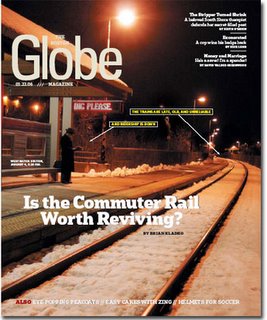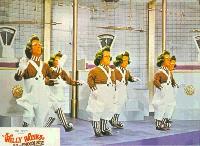
How did the Globe come up with the headline
Is the Commuter Rail Worth Reviving? for today's magazine cover story about the state of the commuter rail system? First off, doesn't something have to dead or near dead to be revived? The juxt of the story is that after ridership increases for seven years, there was a six percent drop this year. OK fine, maybe that's something to look into and base a story on, but that hardly means that the system is near dead. Then further to ask if it is even "worth reviving?" Is that honestly in debate? Sure there is a debate on how and where and even if to invest further in the system, but I don't think there is anyone that would suggest that the system, one of the best in the country, be shut down. Essentially, that is what that headline suggests.
The story itself seems balanced enough, and the inside headline
Commuter Rail at a Crossroads is much more accurate. I just can't believe that the main headline for the story, which was also used on the front page of the paper was so misleading. Being involved in publishing, (I'm a magazine designer and art director) I know how these things happen. The headline no doubt came from someone not even involved with the story. Either some editor who just gave a cursory read to the story, or worse yet, someone in marketing or circulation whose motives were much more about how to "sell" the story than to accurately tell what the story is about. I just did a cover for a local college magazine where the cover headline was suggested by the college's marketing director. Being a very editorial-focused designer, and not understanding what the headline meant, I asked the editor I worked with to explain it, so I could do justice to the design of it. She had no idea what it meant, nor did her boss, the editor in chief. It was written by their boss, the Director of Marketing, or Director of Giving, or something who had the final say, even though he knew nothing about editorial.
As for my view on the merits of the story itself: I'm a big supporter of commuter rail. I have a train station pretty much in my back yard. I commuted by train for years when I worked in Boston, and generally loved it. Sure there are many things about it that sucked. Trains don't run late enough. The conductors are usually jerks: I, and a group of other riders once got pushed off a train at North Station by a conductor, because the train was running late, and had to leave. Any time my wife and I have tried to take the train on a weekend with our kids in their carriage we pretty much know we are going to get yelled at for something. Either because we stood on the handicapped platform, and the train didn't stop there, or because we DIDN'T stand on the handicapped platform, and that's where we need to get on with a carriage. It's a given, that you'll get discourteous service. But this is Boston afterall. What do you expect?
Oh, and while we are on the subject, one thing that does TOTALLY SUCK is
North Station. It's a joke, especially bad because it's relatively new and was built like this. It's so small and cramped, that whenever there is any kind of a delay, it's like a mosh pit in there to get to your train. They add to the confusion, by refusing to let people out onto the platform early, and calling the trains as late as they can, so everybody has to run at once to get there. And who decided to put one tiny bathroom with two stalls in the ENTIRE station, as far away from the train platforms as possible. It's just unbelievable how that place was built, especially when you look at how beautiful and functional South Station is.
OK, so I guess there are plenty of reasons why Commuter rail sucks, but that hardy justifies the Globes completely wrong headline.
Labels: boston, news media, transportation



























